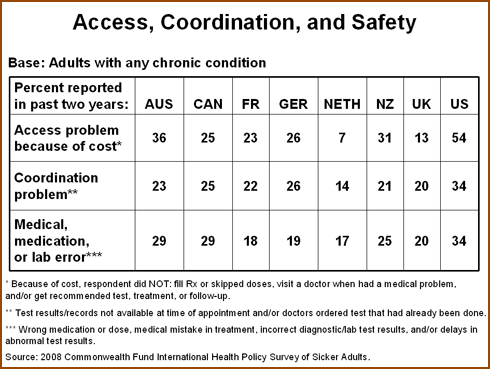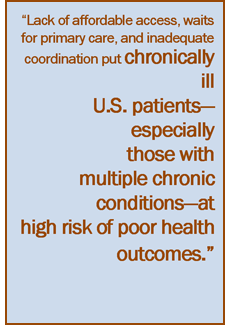Full text is available at:
http://content.healthaffairs.org/cgi/content/abstract/
hlthaff.28.1.w1?ijkey=cOSQSi1j6fDlo&keytype=ref&siteid=healthaff
Synopsis
A 2008 survey of chronically ill adults in Australia, Canada, France, Germany, the Netherlands, New Zealand, the United Kingdom, and the United States found major differences in health care access, safety, and efficiency, with U.S. patients at particularly high risk of forgoing care because of costs and experiencing errors or inefficient, poorly organized care.

The Issue
Across industrialized nations, patients with multiple chronic conditions account for a disproportionate share of national health spending. Such patients often see multiple clinicians in a variety of care settings, putting them at heightened risk for experiencing medical errors and having poorly coordinated care. Because of their extensive contact with the health care system, these patients offer unique perspective on many aspects of system performance.
Key Findings
Study Implications
 While the U.S. did comparatively well on some measures of hospital discharge instructions and patient-centered care, chronically ill Americans often cannot afford to follow recommended care. Gaps in coverage and cost-sharing are undermining access and adherence. The survey finding that in all eight countries, patients most often reported that errors happened outside the hospital highlights the need to focus on ambulatory care and medication safety. Initiatives under way across nations to improve performance through payment reform, information systems, and managing chronic conditions offer cross-national opportunities to learn.
While the U.S. did comparatively well on some measures of hospital discharge instructions and patient-centered care, chronically ill Americans often cannot afford to follow recommended care. Gaps in coverage and cost-sharing are undermining access and adherence. The survey finding that in all eight countries, patients most often reported that errors happened outside the hospital highlights the need to focus on ambulatory care and medication safety. Initiatives under way across nations to improve performance through payment reform, information systems, and managing chronic conditions offer cross-national opportunities to learn.
About the Study
The 2008 Commonwealth Fund International Health Policy Survey of Sicker Adults interviewed 7,500 chronically ill patients in eight countries. Respondents had at least one of seven conditions: hypertension, heart disease, diabetes, arthritis, lung problems, cancer, or depression.
The Bottom Line
Compared with their counterparts in seven other countries, chronically ill adults in the U.S. are far more likely to forgo care because of costs. They also experience the highest rates of medical errors, care coordination problems, and high out-of-pocket costs.